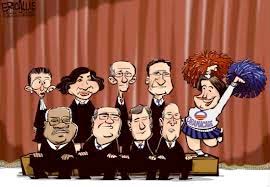 … After life’s fitful fever he sleeps well.
… After life’s fitful fever he sleeps well.
(Macbeth, act 3, sc. 2)
Sometimes during the first century AD, the Greek biographer Plutarch decided to compare in tandem the lives of famous men, and to highlight their virtues or vices. He collected the observations in his famous book “Parallel Lives.”
For the purpose of this article, more than with parallel lives, we are dealing with parallel deaths, but the lugubriousness of the exercise should be tempered by a factual consideration – quite apart from the inevitability that “All that lives must die, passing through nature, to eternity.”(1)
The two departed characters in question – namely, Margaret Thatcher and Antonin Scalia – shared an equal magnitude of contempt by most citizens when alive, and an equal magnitude of elation following their death. Or rather, the dramatic contrast between the praises and the condemnations piled on each after their death, shows, by reflection, the polarization of society and the ideological chasm dividing those remained alive, in this neo-liberal, neo-feudal and neo-screwed up time of ours.
When Margaret Thatcher’s died in 2013, tens of thousands of jubilant citizens across England, those at the base of the pyramid of subordination, took to the streets chanting, “Maggy, Maggy, Maggy, dead, dead, dead.” Whereas the 1% across the ideological divide, the owners of the dignity of unearned privilege, could not praise the departed long or strong enough, convinced that her memory would dwell in a “forted residence, against the tooth of time and razure of oblivion.” (2)
Admittedly on a smaller scale, something similar happened in February 2016, after US Supreme Court Justice Antonin Scalia was found dead in a Texas hotel room, apparently of natural causes.
For reasons irrelevant to the purpose of this article, the Supreme Court of the United States enjoys a reputation that, in the view of many, grossly exceeds the actual worth of the Court’s decisions. Thanks to such reputation, Supreme Court members are surrounded by a mythical halo of Olympic superiority and unsurpassed wisdom.
In reality, the Supreme Court sanctions the prevailing ideology of its members. Which happens to practically coincide with the ideology of the ruling Cabal that appointed the appointers of the Supreme Court judges.
This may be so obvious as to be irrelevant. Except that the concept of the Supreme Court is intertwined with the concept of the Constitution in a distinctly American relationship. The idea is to make of an abstract entity (the Constitution), the supreme repository of the Right Thought. What makes the thought “right” is of course up for grabs. Or rather, unsaid but unquestionably accepted, it is the right of power, and notably of the privileged class who appointed the members of the Supreme Court.
This has an overlooked and yet important consequence. Through a somewhat convoluted and confused intermingling of words and notions, the idea of what is “constitutional” overpowers the idea of what is “ethical” – meaning that ethics can be flushed down the toilet without anyone complaining.
This imaginative line of reasoning is responsible for some remarkable historical decisions by the Supreme Court. For example, slavery was “constitutional”, as well as the genocide of Native Americans, the practical extinction of the buffalo herds on the prairies to starve the Indians, the almost countless wars of occupation, the slaughter and rape of nations and resources, to name a few consequences of sundry “decisions.”
On the same grounds even a factual lie becomes a truth, if it’s “constitutional.” In a moment of remarkable candidness, Karl Rove, a notorious war-criminal of the G.W.Bush cabinet said to a perplexed journalist, “We create our own reality.”
When alive, Scalia gave several related instances of the same idea. Typical was his written opinion that if a trial is conducted “fairly” and the defendant is found guilty, it is quite OK to execute him, even if later it turns out that the defendant was innocent.
Apart from the patently uncertain nature of what is “fair” or of what constitutes fairness, this and other similar Supreme Court deliberations are expressed in “opinions,” often of biblical length. For the delight of those who make a comfortable living by commenting on the proceedings with commentaries, words and “syllables of no allowance to their bosom’s truth.” (3)
But on the occasion of his death, those who benefited from Scalia (or, for that matter, from the Scalias of this world), dug deep into the vocabulary of praise, acclaims, encomiums, accolades, panegyrics, eulogies and tributes. For Obama, Scalia was “a towering legal figure.” For The New York Times, “a combination of brilliance, eloquence and good timing.” For the Washington Post, “the intellectual cornerstone of the court’s modern conservative wing, whose elegant and acidic opinions inspired a movement of legal thinkers and ignited liberal critics.” Actually, the guy was arrogant, rude, cynical and belligerent.
All the presidential candidates, even the “socialist” Sanders, said that Scalia was a “great legal mind.” For George Bush senior, “his admirers and his detractors agreed that Justice Scalia was one of the sharpest constitutional intellects to ever serve on the bench.” It almost prompts the rejoinder, “Speak for yourself.”
Better stop here to prevent any of my 25 readers from becoming sick.
Here are some of Scalia’s legally towering decisions:
Intervening, in December 2000, to halt the counting of votes in Florida and to install George W. Bush in the White House. The 5-4 ruling in the case of Bush v. Gore, was, as predictable then and factual now, a milestone in the decay of American democracy. For Scalia, “there is no universal right of suffrage.” And when later asked about the ruling, Scalia replied, “Get over it.” An answer reminiscent of Vice President Dick Cheney’s verbal trademark invitation to those who objected to his opinions, “F..k you.” It’s no wonder that Scalia and Cheney were bosom friends who went hunting together.
Scalia was the mastermind (refer above to the relation between Constitution and ethics) – the “legal” mastermind of the “war on terror”, via such Orwellian-sounding notions as “unitary executive theory,” “executive privilege,” “separation of powers.” All meaning, in practice, that the president can declare war when and where he wants, and if there are any objectors Dick Cheney’s trademark answer applies.
On arbitrary detention and torture, Scalia opposed the right of Guantanamo prisoners to “habeas corpus”, or the right to petition for judicial review of their detention. When the Supreme Court narrowly allowed some form of judicial review for Guantanamo cases, Scalia denounced the majority as traitors, whose decision “will almost certainly cause more Americans to be killed.”
In a radio interview in 2014, Scalia said that “The Constitution says nothing whatever about torture.” When reminded that the Eighth Amendment, which is part of the Bill of Rights, prohibits “cruel and unusual punishment”, Scalia produced another towering legal opinion, namely that “torture is not punishment.” In similar comments in 2008, Scalia argued that it would be permissible to torture suspected terrorists, and that it would be “absurd to say that you can’t stick something under their fingernails or smack them in the face.”
Scalia favored the death penalty, an opinion supported by the Bible. According to him, the state “derives its moral authority from God … to execute wrath, including even wrath by the sword,” which is, unmistakably, a reference to the death penalty.
In an opinion that inadvertently brings Marx to mind, according to Scalia, the death penalty is “no big deal” for Christians, since Christians believe in the afterlife.
In 2010 Scalia contributed to yet another towering decision, when the Supreme Court found that corporations are people and that money is speech. Meaning that corporations can bribe politicians ad libitum, as their “constitutional” right.
In a ruling that I now forget, the Supreme Court took a decision that favored (or saved) the polluting coal industry. Whereupon a Coal Company Executive said, “Thank God for the rule of law!” Which should lead the more perceptive among us to conclude that God was an American and so His law.
Or rather, what better demonstration that,
In the corrupted currents of this world,
Offence’s gilded hand may shove by justice,
And oft is seen the wicked prize itself
Buys out the law.” (4)
Perhaps the most obvious evidence of the abyss between the ideologies of the one and of the ninety-nine percent came out at Scalia’s funeral, with Vice President Biden in attendance, with former Vice President Dick Cheney and various other characters of the same war-criminal ilk. Along with a contingent of those who spent their lives amidst the obsequiousness of subordinates and the flattery of parasites, and who, by long consulting their own inclinations, have forgotten that others have a claim to the same deference.
The funeral was conducted by Scalia’s son, a priest. He said, “God blessed Dad, as is well known, with a love for his country. He saw in the country’s founding, as did the founders themselves, a blessing—a blessing quickly lost when faith is banned from the public square or when we refuse to bring it there.” Subtext, America will be even more blessed when more religion will be imbued into politics. A more skeptical observer may wonder: with blessings like these, who needs curses.
And on with the establishment’s tributes and fond remembrances of Scalia’s love of wine, sense of humor, large personality, sharp wit, rigorous work ethic and sincere religious devotion.
For the 99% Scalia was a corrupt political thug and a sadist, preaching and helping to implement dictatorial and war powers for the president, (see Nicaragua, Grenada, Yugoslavia, Iraq, Libya, Somalia, etc.- he was appointed by Reagan), forfeiting of basic democratic rights and subservience of the law to corporate and financial interests. He added to his towering legal mind a propensity for towering arrogance and for the distortion of law, logic and language to suit very reactionary ends.
In the end, under the untouchable umbrella of the Constitution, Scalia peddled the ethics of the financial and imperialist elites. Which encompass the cult of the self, the banishing of empathy and the belief that violence can be used to make the world conform. The same elites who, while ransacking the globe, believe they can outrun their own destructiveness.
 Scalia died on a hunting trip, where he intended to kill quails. He who has watched the almost moving scene of a quail hen caring for her chicks following in line, cannot but take some comfort that the hand of death stopped this killer in time. For in the end, Scalia’s contempt for the lives of innocent quails only differed by degrees from his contempt for the lives of innocent men.
Scalia died on a hunting trip, where he intended to kill quails. He who has watched the almost moving scene of a quail hen caring for her chicks following in line, cannot but take some comfort that the hand of death stopped this killer in time. For in the end, Scalia’s contempt for the lives of innocent quails only differed by degrees from his contempt for the lives of innocent men.
- Hamlet
- Measure for Measure
- Coriolanus
- Hamlet
In the play (opening quote). Macbeth’s comment on King Duncan whom Macbeth has just slain. ‘Fitful’=’ Varying between extremes, full of paroxysms’
